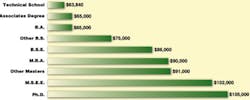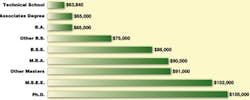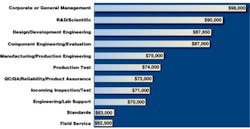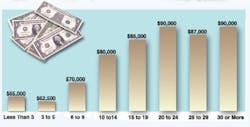A pat on the back can go a long way. Many engineers who were interviewed for the 2007 EE-Evaluation Engineering Salary Survey said that although salary is important, being recognized for their engineering contributions is just as significant. Others said the love of engineering negates any inequalities in salary.
�It is nice to be paid, but to be a productive engineer, I need to enjoy what I am doing as well as be recognized for what I accomplish,� said Kurt Veggeberg, a business development manager for sound and vibration at National Instruments. Mr. Veggeberg helps customers configure systems for audio measurements; noise, vibration, and harshness; and high channel-count dynamic signal acquisition.
Larry Wachowiak, a contract engineer at Hamilton Sundstrand, agreed that salary is not directly connected to a level of satisfaction at work. He said that the �knowledge that what I do is valued� is important. Job happiness also comes from the camaraderie of associating with like-minded people, he said. Hamilton Sundstrand designs and manufactures aerospace equipment.
But let�s be honest. Professional accolades don�t put food on the table or pay college tuition for the kids.
�Salary is why most of us work,� said Steven Klock, a development engineer for Sanmina-SCI, which assembles servers, phone switch boxes, medical equipment, cell-phone repeaters, and data-storage devices. �In my case, salary is only part of the satisfaction. I love the challenges, the people, and a job well done. The salary paid me is what the company thinks of me. The lower the salary, the less [I feel] appreciated,� he said.
Salary is a key factor to job satisfaction for Mario Guzman, a senior design engineer for Altera. The company designs system-on-a-programmable-chip (SOPC) solutions. �Other factors are your perception of how much the company cares about you and whether or not what you are doing is something you like and excites you,� he said.
A salary that reflects the value of work done should be expected, said Steven Vornsand, a hardware engineer for Emerson Appliance Controls. Engineering creates and facilitates the world we live in, Mr. Vornsand pointed out. �It is not reasonable, let alone fair, to see so much of the non-value-added vocations compensated at levels many times greater than that of engineers. As such, motivation for the engineering profession�both for new entries into the field as well as those who have been in it for many years�often is suppressed,� he said. �It is a credit to the deep convictions to the profession that engineers have in overcoming such disparities.�
Mr. Vornsand said most engineers still place their dedication to the field of engineering above salary. He said job satisfaction comes from learning new technologies, solving problems, and creating and designing new things.
What�s Really Important
A record number of people�1,236�responded to this year�s survey that showed the overall median salary increased to $84,000 in the past 12 months. Last year�s median salary was $80,000. The median age of those who took this year�s survey was 48.
A total of 58% of the survey takers said they are satisfied with their current job and overall career. Some 29% are very satisfied with the job they have today and 32% very satisfied with their overall career.
More than half of the EE readers who participated in the salary survey said their career-satisfaction level was the same as last year while almost 25% were more satisfied this year. Only 20% were less satisfied with their career.
�We all wish to make more money,� said Paul Trotter, a quality manager for both commercial and military programs at Commercial Microwave Technology. The company provides microwave filters for the telecommunications and military satellite industry. �I am not one to chase the dollar. I�m sure that another company would pay more for my services; however, I�m happy here.�
�Salary, although indirectly connected, is not the source of satisfaction in my day-to-day job,� Mr. Trotter continued. �Implementing new ideas, processes, and systems is where I find satisfaction.�
The 2007 survey asked readers to list three career issues that are most important to them. The list included education, job security, outsourcing, pension, professional ethics, salary, technical obsolescence, and work/life balance. Of those who responded to the survey, 66% stated that salary was most important, 64% chose the work/life balance, and 57% selected job security.
A variety of personal�rather than professional�reasons shaped the answers to the career-issues question. Edward Ganshirt chose a work/life balance as his number-one choice because he has moved back home to care for his elderly parents. Mr. Ganshirt is a senior electrical engineer at Medica, a corporation that makes medical diagnostic devices used in clinics and laboratories. He said his parents now take priority and his company has adjusted to it.
Along with job security, Mr. Klock from Sanmina-SCI also chose work/life balance as one of his priorities �because we only live once,� he said. �Companies want engineers to work 60- to 100-hour weeks. Families grow up too fast; life moves on. If you�re working all the time and management gets most of the financial rewards, the job isn�t worth the sacrifice.� Mr. Klock�s duties are test engineering, test-equipment purchasing, and customer interface.
The survey results pertaining to the career-issues question make perfect sense to Emerson�s Steve Vornsand. �Outsourcing, pensions, and technical obsolescence may be seen as problems by some, but the seasoned engineer will treat them in the same way as any other challenge�something to be overcome and solved,� he said. �It is the nature of an engineer to fix it rather than complain about it.�
Salary by the Numbers
Besides being 48 years old, the average engineer who responded to the 2007 salary survey was in design and development and had a bachelor of electrical engineering degree. For those who took the survey and have a B.S.E.E., their median salary was $86,000 while other bachelor�s degrees were at $75,000.
The highest median salary level was accrued by respondents with a Ph.D. at $105,000 and the second highest by those with an M.S.E.E. at $102,000. Survey takers who earned a master�s in business administration had a median salary of $90,000, and other master�s degrees were paid $91,000 (Figure 1).
Readers working in corporate and general management positions ranked number one with a median salary of $98,000 followed by research and development at $90,000, and design and development engineering came in third place at $87,650. Component engineering workers were paid the fourth highest median salary at $87,000 and manufacturing and production engineers the fifth at $75,000. See Figure 2 for a more complete comparison of median salary by job function.
Figure 2. Median Salary by Job Function
Survey participants who live in the Pacific region of the nation were paid the highest median salary at $93,000, and the Mountain region was next with $86,500. An unusual result was reported in the Central, Southeast, and Northeast areas of the country where all three had the same median salary of $80,000 (Figure 3).
Although some survey takers who were interviewed felt the length of time in an engineering career is shrinking, results showed those who worked the longest in the industry were paid the most. Survey participants who spent 30 or more years in the electronics industry had a median salary of $90,000. Workers with 20 to 24 years of experience and 25 to 29 years of experience had a median salary of $90,000 and $87,000, respectively. A total of 15 to 19 years in the field ranked fourth at $85,000, and those with 10 to 14 years were fifth with $80,000 (Figure 4).
When asked if they would recommend engineering as a career to their children, 75% of the electronics professionals said yes. �While I believe that much of the engineering that is outsourced is typical and repeatable engineering,� said George Burall, a principal hardware engineer for EFW, �specialized and adventurous engineering opportunities will stay here, and more will open up. So, yes, I would recommend engineering as a career to someone who has the engineering bug.� EFW provides research, development, and manufacturing capacity to the military community.
Roger Landon, who has worked more than 40 years in the electronics industry, said he also would suggest engineering as a choice of employment to his children. The component engineer for DRS Signal Solutions said his two children did not choose engineering careers, but they work in fields that are possible because of engineers and are aware of that contribution. �Engineering is still a well respected career, and it still pays well,� he said.
�I recommend engineering simply because it is the best way to make a real, positive difference in society,� Mr. Vornsand of Emerson said. �Engineers are creators, they add real productivity and growth to the GNP, and they produce things that improve the quality of life worldwide. Without engineers, there would be no civilization. When youth hear and understand this, they are moved and motivated to consider how they might become an engineer.�
Mastering New Technology
Almost 75% of the EE readers who took the salary survey indicated that they did not actively look for a new job in the last 12 months, and 67% do not plan to look for a new job in 2007. A total of 80% also responded that they do not expect a promotion in the next year.
The survey showed that 39% of respondents are very secure in their present job and 51% somewhat secure. However, 65% of the survey takers do not feel more secure in their current job this year than last year.
This year�s survey also inquired about web seminars (webinars) and web-based training programs. Mr. Landon of DRS Signal Solutions said portions of webinars are very good. �It allows the engineer to stay up with the latest technology and often ask questions of the people developing the technology,� he said. �You don�t have to travel to get the information, and the seminar tends to be focused.�
A total of 57% said they participate in webinars, and 44% said their participation level would probably increase in 2007. �Education is necessary to continue in this field, and webinars are the easiest way to learn from the experts,� said Mr. Klock.
In addition to attending webinars, Mr. Veggeberg also conducts them. �Webinars can be an efficient way to teach or learn. They also are a good supplement for meetings or a way to decide whether a face-to-face meeting is in order,� he said. Whether it is continuing education or keeping up with technology trends, 47% of the survey responders incorporate webinars into their professional life.
Conclusion
Perhaps Mr. Burall best summed up the attitude of today�s engineering professionals: �Happiness is when the testing passes the first time. Effectiveness is more about working together for each other�s common good than about individual contributors, and high satisfaction comes from being able to say at the end of the year I did my best, and I wouldn�t do anything differently.�
April 2007




